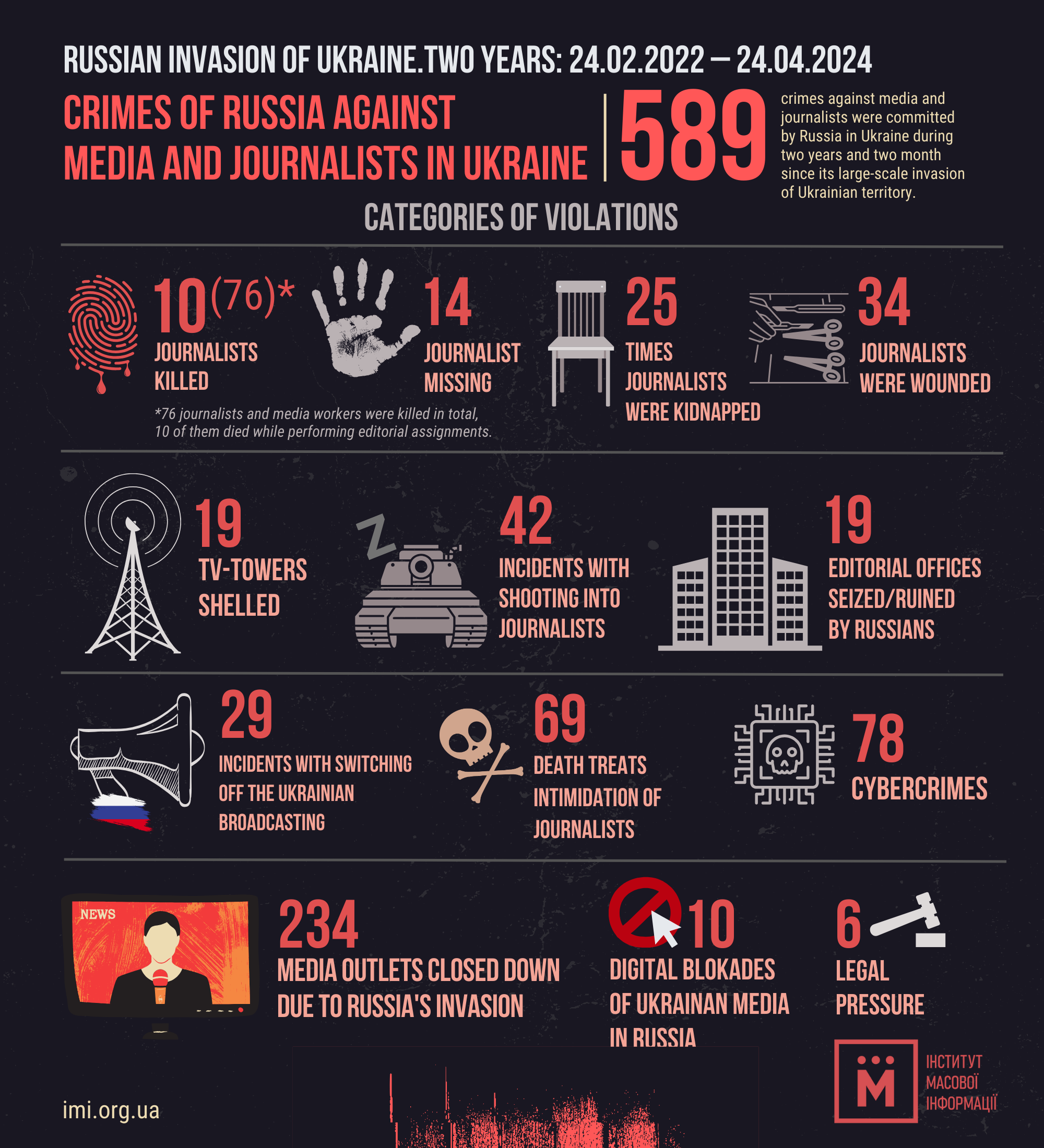589 crimes against the media and journalists in Ukraine committed by Russia in the two years and two months of the full-scale war
Russia committed 589 crimes against journalists and the media in Ukraine in the two years and two months since the start of the full-scale invasion.
This is evidenced by the monthly monitoring "Freedom of Speech Barometer" by the Institute of Mass Information.
In March – April of 2024 the IMI recorded 14 freedom of speech violations committed by Russia: kidnapping and injuring journalists, damaging media offices, death threats, cyber attacks, shelling strikes on TV towers and disabling Ukrainian broadcasting.

Russia's crimes against the media and journalists in Ukraine since the start of the full-scale invasion
The Russian aggression resulted in the deaths of two media workers who were defending Ukraine from occupation. The death of one was only reported in April, as he had been considered missing:
- Mykola Oransky – a soldier and formerly a TV studio engineer at hromadske. Killed during a combat mission near Robotyne, Zaporizhzhia oblast, on March 22, 2024. He was a UAV operator in the separate mechanized brigade No. 118.
- Oleh Shemchuk – a journalist investigator from Zaporizhzhia who went missing in action near Bakhmut, Donetsk oblast, in September 2022. Declared dead on April 3, 2024.
At least four journalists were injured by Russian shelling strikes on Kharkiv and Zaporizhzhia in early April. They all came under “double tap” strikes while filming the aftermath of the previous attacks.
Namely, “Nakypilo” journalist Victor Pichuhin and “Novyny.Live” reporter Yulia Boyko were injured in Kharkiv. They came under fire on the night of Apirl 4 while filming the aftermath of the Russian mass drone strike on the city. Victor had a concussion. Yulia Boyko was diagnosed with barotrauma and a mild concussion. They were saved by the State Emergency Service car parked nearby, which shielded them from the shock wave.
The April 5 strike on Zaporizhzhia injured TSN (1+1) journalist Kira Oves (she had her temple stitched) and Ukrinform correspondent Olha Zvonaryova. The latter was wounded on the leg. She was hospitalized in a serious condition with severe trauma and blood loss and remains in the hospital now. She had surgery; her state has stabilized.
Minister of Internal Affairs Ihor Klymenko said that “the enemy cynically strikes again just when the police, emergency workers, medics, and journalists arrive. At the moment when our units are trying to rescue the victims.”
Furthermore, a Russian strike on Zaporizhzhia damaged the office of the media outlet RIA Pivden, which had relocated from Melitopol. Before the full-scale invasion RIA Melitopol used to be the largest website in the Zaporizhzhia oblast audience-wise. After the start of the full-scale war and the Russian occupation of Melitopol, the team and the chief editor, Svitlana Zalizetska, faced persecution.
The Russians keep pressuring RIA Melitopol journalists. In April, they urged the administrators to surrender as prisoners in a Telegram post. Namely, they offered the journalists to "go out into the Victory Square" in "liberated Melitopol" and surrender. The post with the call featured a World War 2 era photo of German Nazi occupiers surrendering as prisoners, and contained hate speech towards Ukrainians.
Moreover, in April it was reported that RIA Melitopol (RIA Pivden) journalist Anastasia Hlukhovska, who was detained by Russia together with the administrators of the Telegram channels RIA Melitopol and “Melitopol is Ukraine” in August 2023, has been in detention for almost eight months.
The journalist's name had not been revealed until now out of safety considerations, as requested by her mother. To date, the family's attempts to find Anastasia have yielded no result. The occupiers give out no information on the whereabouts of the Melitopol journalist.
On April 22, the Russian troops targeted a TV tower in Kharkiv, destroying it. The TV tower was the tallest building in the city – 245 meters high. It should be noted that TV towers are civilian objects and destroying them is a war crime.
The shelling strike on the Kharkiv TV tower resulted in digital broadcasting disappearing in the city and the nearby municipalities.
The Russians resumed the shelling of Ukrainian TV and radio infrastructure in 2024. Previously, the IMI recorded such incidents back at the beginning of the full-scale invasion in 2022 (back then, 16 cases of the Russians shelling TV towers, which are civilian objects, were recorded).
Russia continues to target Ukrainian media with cyber attacks. In March – April, the IMI recorded at least five such cases. The enemy was attacking Ukrainian TV channels on the Astra4A and Hot Bird 13G satellites, jamming their signal, interrupting their broadcasting and streaming their own propaganda. The 1+1 Media’s channels, Freedom, and others were affected.
In addition, the Russians attacked the Poltava news website “Zmist” for several days. The website was running slower and asking visitors to confirm if they are human. The team told the IMI that they view the situation as an attempt to destroy an independent media outlet and crowdfunding platform that is supporting the army. In the future, "Zmist" plans to make the website unavailable in Russia and Belarus.
Read more here.
The Institute of Mass Information (IMI) is a Ukrainian public media organization that has been operating since 1996. The IMI defends the rights of journalists, analyzes the media field and covers media-related events, fights propaganda and disinformation and has been providing media outlets with safety gear for trips to the combat zone since the start of the Russo–Ukrainian war in 2014.
The IMI carries out Ukraine's only freedom of speech monitoring and keeps a list of high quality and sustainable online media outlets, documents Russia's crimes against the media committed in the course of the war on Ukraine. The IMI has representatives in 20 oblasts of Ukraine and a network of "Mediabaza" hubs to provide journalists with continuous support. The IMI's partners include Reporters Without Borders and Freedom House; the organization is a member of the International Organization for the Protection of Freedom of Expression (IFEX).
Help us be even more cool!

